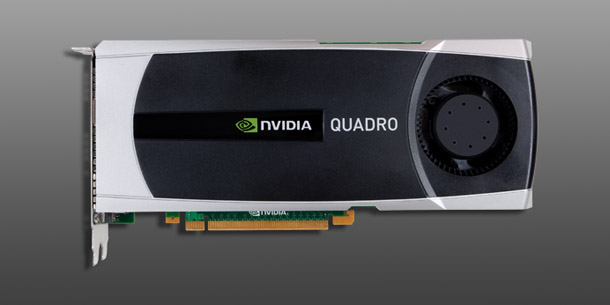GPU review: Quadro 5000 vs GeForce GTX 580

Are workstation graphics cards worth the cost, or would you be better with a games card? The NYC 3ds Max user group attempted to settle the issue, pitting Nvidia’s Quadro 5000 GPU (above) against a GeForce GTX 580.
One of the most common comments we see on CG Channel GPU reviews is: “That’s great, but why don’t you include consumer cards in your group tests?”
(Short answer: because AMD and Nvidia don’t provide them. Longer answer: this post discusses our reviews policy in more detail.)
The NYC 3ds Max user group has got around this problem by getting hold of their hardware from a distributor, so its latest review* pits a workstation card against a consumer model.
In their tests, the $1,800 Quadro 5000 goes head to head against the $430** GeForce GTX 580.
The two cards aren’t exact matches (the Quadro has 2.5GB of onboard RAM to the GTX 580’s 1.5GB, for example), but it gives you some idea of how pro and games cards square up.
The GTX 580: good for sims, but a slower viewport
The conclusions? The GTX 580 came out a clear winner in the glu3D fluid simulation test (more CUDA cores available for GPU processing), there was little difference for MassFX simulations, and the Quadro 5000 was a clear winner for day-to-day viewport performance.
As authors Kim Lee and Lais Williams conclude:
“If I had only one machine and needed to choose between the two cards, I would get a Quadro 5000 because it would positively affect 90%-95% of my work. For a second machine, I would get a GeForce GTX 580 and use [it] to run my liquid sims, and eventually rigid body and cloth sims.”
Room for more tests
With reviews, the devil is in the detail, so it’s worth reading the original to see how closely the test set-up mirrors your own, and there’s plenty of scope for further tests (iray rendering would be a popular addition, for example).
And, as our own Jason Lewis has pointed out, raw speed isn’t the only factor when comparing pro and games cards: stability and after-sales support also need to be considered.
Still, these are interesting results, and the most detailed of their kind that we’re aware of. Good work, guys.
Read the full review on the NYC 3ds Max user group website
*Actually, the testing was done last month: we’ve been meaning to post about it for ages.
**Prices from Newegg.com as of 4 July 2012.
